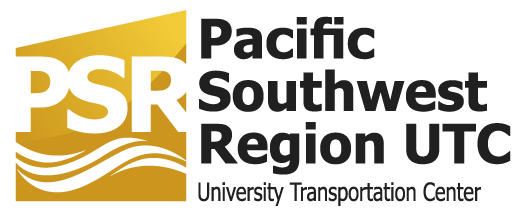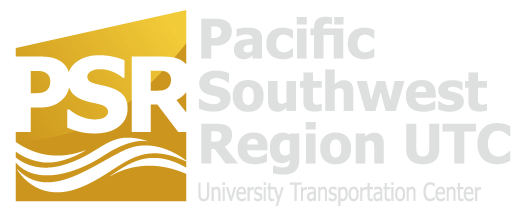Education
Stop the VideoEducation


PSR’s education goal is to foster education and training to produce the next generation of academic scholars, professionals, and skilled workers. PSR attracts large numbers of the best students from non-traditional transportation fields – especially those from underrepresented groups – into transportation careers through personal and targeted recruitment from high schools, community colleges, and universities; expands and enhances the multidisciplinary aspects of our transportation education programs, and student exchanges among campuses; and conducts a comprehensive workforce development program. The universities in the PSR consortium train a very large share of the region’s and the nation’s transportation professionals. Thousands of students graduate from our many transportation degree programs each year, who then go on to work in a wide array of public and private sector transportation positions, many to assume leadership roles. Both degree and non-degree programs are offered at CSULB and UH. Pima offers two-year degree and certificate programs.
Please click on links below for more information and for links to each partner’s transportation related educational programs.
- University of Southern California
- California State University, Long Beach
- University of California, Davis
- University of California, Irvine
- University of California, Los Angeles
- University of Hawai'i
- Northern Arizona University
- Pima Community College
Programs Supporting and Improving Transportation Education Programs
We conduct the following to support and improve degree programs of the partners: PSR curriculum database; postdoctoral researchers; graduate research fellowship programs; and graduate student exchange programs.
Student Research Project Support
PSR funding is used to support several student research projects each year. A list of all projects can be found on our Funded Projects page.
Connecting Students with Industry
We facilitate connections between students and the transportation industry in four distinct ways: offering professional development opportunities (job fairs, resume assistance and job talk preparations for PhD students); promoting participation in professional organizations; mentorship programs; and supporting our students to attend seminars and workshops.
New Entrants and Workforce Development
K-12 outreach: Many PSR partners are involved in K-12 outreach efforts, and PSR supports and expands these efforts.
USC Viterbi School of Engineering offers PK-12 programs giving opportunities to students, teachers, parents and the community authentic STEM experiences. The school provides a wide variety of campus events, school-based programs and summer programs to support the community. METRANS PSR cosponsors Engineering is SWEll and Engineering is SWEet, semi-annual events for girls from local elementary schools to be exposed to STEM fields and higher education while they participate in a variety of engineering workshops and learn basic science principles on the USC campus.
The UCI Samueli School of Engineering has formed collaborations with K-12 schools to introduce students to career options and provide mentoring, life skills, and career counseling for underrepresented students. Building on this program, UCI PSR transportation faculty focus specifically on recruiting students into the transportation field. UCI PSR faculty collaborate with MESA staff to develop educational modules and experiential learning activities that focus on transportation.
NAU is home to the Center for Science Teaching and Learning (CSTL), which aims to improve STEM education in Arizona and beyond through innovative partnerships, programs, services and scholarship. With PSR support, NAU faculty work with CSTL to include transportation-related content.
At CSULB, the Center for International Trade and Transportation designs and implements an annual Teacher Externship Academy in conjunction with the Port of Long Beach. The Academy helps high school teachers incorporate trade and transportation related topics into their lesson plans pairing teachers with industry mentors.
Geospatial technology education: Geospatial technology education is rare outside of colleges and universities and is often unavailable to underserved communities. CSULB and Pima are developing a Train-the-Trainer GIS Initiative to teach high school and community college instructors how to incorporate geospatial technology and modeling (GIS) into their curriculum. The two colleges will promote this opportunity to instructors at underserved schools throughout Nevada and Arizona. An important benefit for instructors who attend the training (beyond GIS knowledge) is access to ESRI software and licensing, a major financial hurdle for most underfunded learning institutions. ESRI has committed to provide software and licenses as in-kind cost share.
Transportation workforce soft skills: Significant gaps in general workplace skills (soft skills) consistently emerge as leading workforce development challenges in transportation labor market research. To address this skills gap, CSULB and Pima work together to develop a series of lesson plans that help high school and community college instructors integrate transportation workforce soft skills into their courses. CSULB produces a webinar that features best practices from GIS, commercial driver’s license (CDL), and supply chain and logistics professionals, recorded and archived on the PSR website.
Best practices in online commercial driver’s license (CDL) training: To grow the program, Pima uses PSR funding to transition sections of its in-class CDL program into an online format. In addition, CSULB uses PSR funding to develop a webinar that presents innovative ways to expedite and expand CDL training opportunities. That webinar draws from the partnership between Pima and Schneider National to eliminate barriers to entry for underrepresented groups (women, veterans, tribe members, and non-native English speakers).















